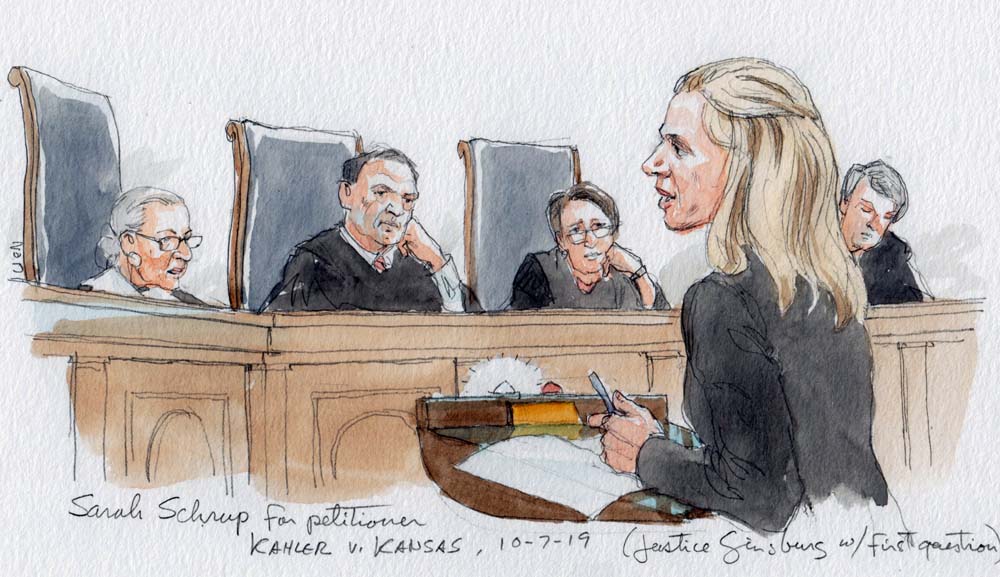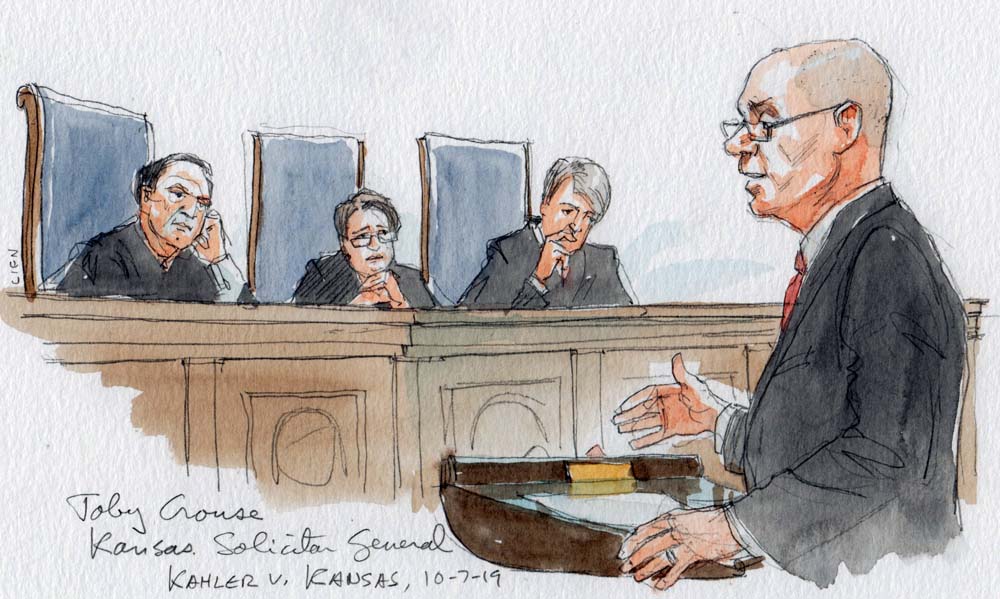Argument analysis: Justices open new term with questions and concerns about insanity defense

on Oct 7, 2019 at 3:58 pm

In 2009, James Kahler shot and killed four members of his family – his two teenaged daughters, his ex-wife and her grandmother – during the weekend after Thanksgiving. Kahler’s young son was at the scene but ran out the back door and was not physically harmed. When Kahler’s case went to trial, an expert testified that Kahler had been so depressed at the time of the shooting that he couldn’t help himself. However, under Kansas law Kahler couldn’t argue that he was not guilty by reason of insanity, because Kansas does not offer an insanity defense: In 1995, the state replaced the insanity defense with a new law that allows a defendant to argue that he could not have intended to commit the crime because of his mental illness but makes clear that mental illness “is not otherwise a defense.” Today the Supreme Court heard oral argument on the constitutionality of the state’s decision to abolish the insanity defense. The justices appeared to be closely divided and had a wide range of concerns, ranging from the perception that the state’s rule is a departure from past practice to skepticism that, even if an insanity defense were available, Kahler would qualify for it.
Arguing for Kahler, attorney Sarah Schrup began by emphasizing that, for centuries, a defendant’s culpability hinged on his ability to distinguish between right and wrong. The insane, she stressed, lack that capacity.
Justice Ruth Bader Ginsburg asked whether a state could decide that it wanted to “rethink” the insanity defense, creating the prospect that someone could be found guilty but nonetheless insane and then committed to a psychiatric hospital instead of prison. Would that violate the Constitution, she asked?
Schrup pushed back, arguing that someone who is insane historically would not have been subject to prosecution at all. And a conviction, she added, could carry a stigmatizing effect.
Justice Samuel Alito worried aloud that, if the “general rule” were that a defendant can’t be convicted if he believed that his actions were moral, it would result in a “revolutionary change” to criminal law. All that Kahler’s proposed rule would add, Alito continued, is that the defendant’s belief be caused by a mental disorder. But “it has been calculated that one in five people in the United States has some mental disorder,” Alito observed, which would mean that many people would be able to raise an insanity defense if Kahler prevailed.
Schrup again countered that the key question is whether a defendant is able to distinguish between right and wrong. People who have a mental disorder should “be given the opportunity to at least try” to make this showing to a jury, she told the justices, and juries in the states that still offer an insanity defense have been able to draw this distinction.
But Justice Brett Kavanaugh was uncertain whether juries are in fact capable of doing so. Legal experts, Kavanaugh suggested, believe that juries may not be able to “parse these fine concepts.” Why isn’t it reasonable, Kavanaugh asked, for the state to try to address this problem by taking away insanity as a separate defense and letting the jury consider the defendant’s mental status as part of criminal intent and at sentencing? “So they haven’t necessarily abolished the insanity defense. I think that’s a bit of a misnomer,” Kavanaugh concluded.
Both Alito and Chief Justice John Roberts expressed some doubt that, even if the justices were to rule for Kahler, it would make a difference in his case. Roberts cited some of the evidence of Kahler’s mental state, noting that he had been described as someone who “thrived on self-importance” and valued the perception that he had a perfect marriage. That may not be the best way to order your life, Roberts said, but it isn’t necessarily evidence of insanity.
Alito echoed that thought a few minutes later, characterizing Kahler as an “intelligent man” who “sneaked up on the house” owned by his ex-wife’s grandmother. Kahler killed his ex-wife and her grandmother and “executed” his teenage daughters, Alito emphasized, but spared his son “because he didn’t think the son was siding with the mother.” This is the stuff, Alito asked somewhat incredulously, that you are going to use to argue that Kahler didn’t know right from wrong?
Justice Neil Gorsuch wanted to know how broadly an insanity defense would need to be made available if Kahler prevailed. Would it be required for all felonies, he queried, or would it sweep more broadly than that?
Schrup responded that it “should be applied everywhere,” but she tried to give Gorsuch some comfort by pointing out that it is a “rarely used defense”: “It’s invoked in less than one percent of the cases and successful in only a quarter of that.”
Kansas Solicitor General Toby Crouse faced questions from some of the court’s more liberal justices, who feared that the state’s rule would result in the conviction of defendants with mental illnesses. Justice Sonia Sotomayor observed that the Kansas rule, by focusing only on whether a defendant intended to commit the crime, would not excuse someone “who would have been considered a lunatic” in the 15th century – for example, someone who hears voices. Such a defendant, Sotomayor said, might know that he is killing someone but have “no ability to say no.”
Justice Stephen Breyer joined in, asking Crouse about two different defendants, both of whom have been certified as “totally insane.” One defendant kills someone he thinks is a dog, while the other kills someone he knows is a person because he thinks a dog told him to do it. When Crouse acknowledged that the second defendant would have the kind of criminal intent needed for a conviction – because he intended “to commit a crime against a human being” – while the first would not, Breyer pressed him, asking, “Why should they be treated differently?”
Arguing on behalf of the United States in support of Kansas, Assistant to the Solicitor General Elizabeth Prelogar cautioned the justices that a ruling for Kahler might create more problems than it solved. Even in the states that recognize an insanity defense, she emphasized, there is “no agreement on when mental illness should excuse criminal responsibility.” Offering as an example a case in which a defendant hears voices that command him to kill to save the human race, she told the justices that in a “substantial number” of jurisdictions, the defendant still would not be able to invoke an insanity defense.
Justice Elena Kagan appeared unpersuaded. What you seem to be proposing, she told Prelogar, is simply a basic intent requirement that doesn’t have anything to do with insanity. But looking back at history, Kagan noted, “there’s just a ton that suggests there was something more than that the defendant be able to form an intent to kill.”
A decision in the case is expected by sometime next year.
This piece was originally published at Howe on the Court.




